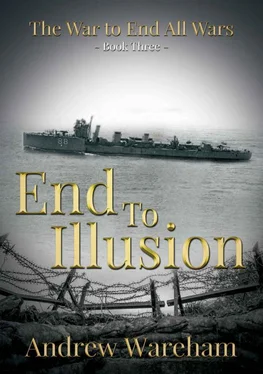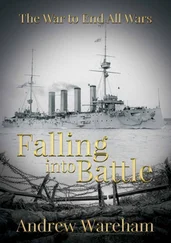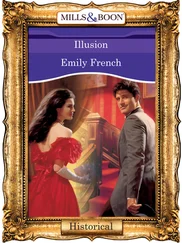That was not quite correct but Higgins might be the better for believing that his captain wanted him.
“Being a bigger boat there is another sub as well as the First Lieutenant, the existing men in the posts. I know nothing of seniority but you are likely to be junior, Mr Higgins, being newly promoted. Lancelot is a faster boat, if only by two knots, and has a greater endurance than Sheldrake and we can expect to be out for three or four days at a time, on occasion. Clear your cabins and be ready to leave for the depot ship and eat dinner there.”
It would take a bare ten minutes to pack their bags, life on Sheldrake being Spartan.
Three men came aboard in mid-afternoon, the new First and sub and mid together. Each carried a duffle bag and a pair of suitcases, needing the extras to carry their Mediterranean uniform.
They saluted and introduced themselves and showed all the demeanour of men released from prison.
“Bloody Scapa! No sunshine in winter. The wind never stops blowing. Cold, wet and miserable and unchanging. Bad on a big ship. Bloody impossible on a destroyer! Now we’re off to the Med! Don’t care what we’re doing or why! The Med!”
The officers going to Lancelot showed sympathetic, tried not to show thankful that they had escaped both Scapa and the pointless patrols that seemed likely in the Mediterranean.
“Bit of a crack ship, Sheldrake, of course! Made a name for herself this last few months. We’ll try to keep it up.”
They tried to be polite.
Captain McDonald arrived to the second of four o’clock and proceeded through a rapid takeover.
“The Commodore tells me you are to stay here at Harwich, Captain Sturton. I rather fancy the Med! Anything I should know about the ship?”
“Very little, McDonald. She is in good order, though getting old for a boat. The Chief ERA is good, can often pull a little extra out of the hat when you need it. The Coxswain is one of the best, the rest of the hands reliable with only one bad hat among them – and he has been quiet these last few weeks. You have a very good Leading Hand working to the Gunner, will probably make Gunner’s Mate in a year or two. All in all, Sheldrake is in good condition. I have been lucky in her.”
“DSC and bar doesn’t say ‘luck’ to me, Sturton! I hope I can do as well for the ship as you have.”
It was all very gentlemanly, and rather pointless, Simon thought. He glanced down into the boat, saw Packer there with his bags, ran down to the sound of the pipes.
An hour later and he was sat in the depot ship, glass in hand, relaxing and waiting for dinner.
“Does anybody know anything about Lancelot?”
“Unlucky ship, Sturton. You’ll have to turn her around.”
He settled down to listen to the tale.
“The announcement is made, Richard. It is in the columns of The Times. The Thunderer has spoken from on high! ‘A marriage has been arranged between Miss Primrose Patterson, daughter to Lord and Lady Elkthorn, and Colonel Richard Baker, VC, son to Mr and Mrs George Baker of Kettering.’ All in the most official form, sir!”
Primrose’s gleeful smile faded; she looked sideways at Richard, wonderingly almost.
“I never really thought I would see those words in print, not for me, Richard. Always the odd one out – ‘poor old Primmers, far too blue for her own good, don’t you know!’ All the ‘gels’ were united in that opinion. ‘Never catch a husband if she did not mend her ways and put those books away – can’t dance, either.’ Ha! You have shown them, Richard!”
“So I have, Primrose – and with the greatest of pleasure! By the way, your mother seems to have little to say to me. Does she disapprove?”
“No, not at all! It is merely that she did not expect me to make a match at all and she does object to having her little world upset. She had quite made up her mind that I was to be the companion of her old age and now she has to find another for that post. My father is ten years her elder so she expects some years of widowhood – which she will not object to, at all. I believe that I have no brother because of her decision that she would not go through another pregnancy and birth, neither of which she enjoyed. She banished poor Papa from her bedchamber many years ago. I believe he has another female – I will not call her a lady – established in a little cottage in St John’s Wood – quite the place for such things. He is not too disturbed because the son of his favourite brother will succeed to the title and all will be well there.”
Richard was entertained to hear the family scandal so candidly laid out – it was typical of his Primrose!
“Do you not feel aggrieved that the title cannot descend to you, Primrose?”
“No – was I a suffragette then I might be, I suppose… I am not one of them, however. Mostly because Papa is a political figure, in a lesser way, and I have met so many of the breed and cannot like them at all! Now, of course, there is this little beast Lloyd George who seems to spend the bulk of his life with his trousers about his ankles in the hope that any female may come close. A surprisingly large number do, one is told!”
Richard was not au fait with political gossip, had not heard that of the Chancellor of the Exchequer. He was surprised, but not greatly; every politician was a grubby beast in the military eye. It amused him to discover that he was a military man now.
She continued in her musings, aloud, as always.
“The money is a different matter, of course. The land must go with the title – not a huge, great deal of it and covered in farmers and such. A few thousands of acres but not one of the enormous estates… Not my idea of a way to spend one’s life. I believe Cousin Alfred, who is the heir, desires nothing better than to don a pair of gaiters and wade out into the mud of the jolly Shires… A very agricultural sort, dear Alfred!”
“Has he not joined the Colours?”
“No – blind as a bat! So short-sighted he could never lead a platoon in any direction at all. Best he should stay at home and grow potatoes and pigs. Like poor young John Kipling – bottle-glass spectacles. At least his father has no patriotic reputation to maintain and will not force him into the Guards!”
Again, Richard had not heard the story. On being told, he disapproved.
“The Guards will not permit young Kipling to wear spectacles on duty, you know, Primrose.”
“Then the poor boy will not see five feet in front of his nose. A disgrace!”
“I am glad to hear Cousin Alfred has a father who cares more for him than for his own name!”
“I had thought you might approve of every young man going off to war, Richard?”
“No. Not if he cannot honestly do so. We need men in England as much as we require bodies at the Front. More so, perhaps – we cannot fight without the factories to make our guns and shells. And aeroplanes and ships, thinking of it. It is wrong to force the incapable to battle. Pointless, too – they will only die without achieving anything. If Alfred cannot see without his spectacles, then it is entirely right that he should work in England and grow our food. Has he fields to cultivate himself before he inherits?”
“Yes, or so I believe… As I understand the matter, Papa gave the management of our lands to his brother. He acts as our agent, not so much for the income – he is well off in his own right, my grandfather having been very rich – as for love of the Land. Alfred has grown up on the estates and since he has fallen into line for the inheritance, has come very much to regard them as his own.”
“A good thing for the family.”
“Yes indeed, Richard. Papa has spoken with me about the Will, thinking I would be a spinster lady for not ‘taking’ in Society, and I am to have much of the money but none of the land except for a house somewhere in Hampshire. The place was inherited from some sort of maternal connection a few years ago – a great aunt or somesuch – and has a few acres of parkland as well as a dozen or two of bedrooms and will make a fine country residence for the family. Has Papa discussed finances with you?”
Читать дальше












